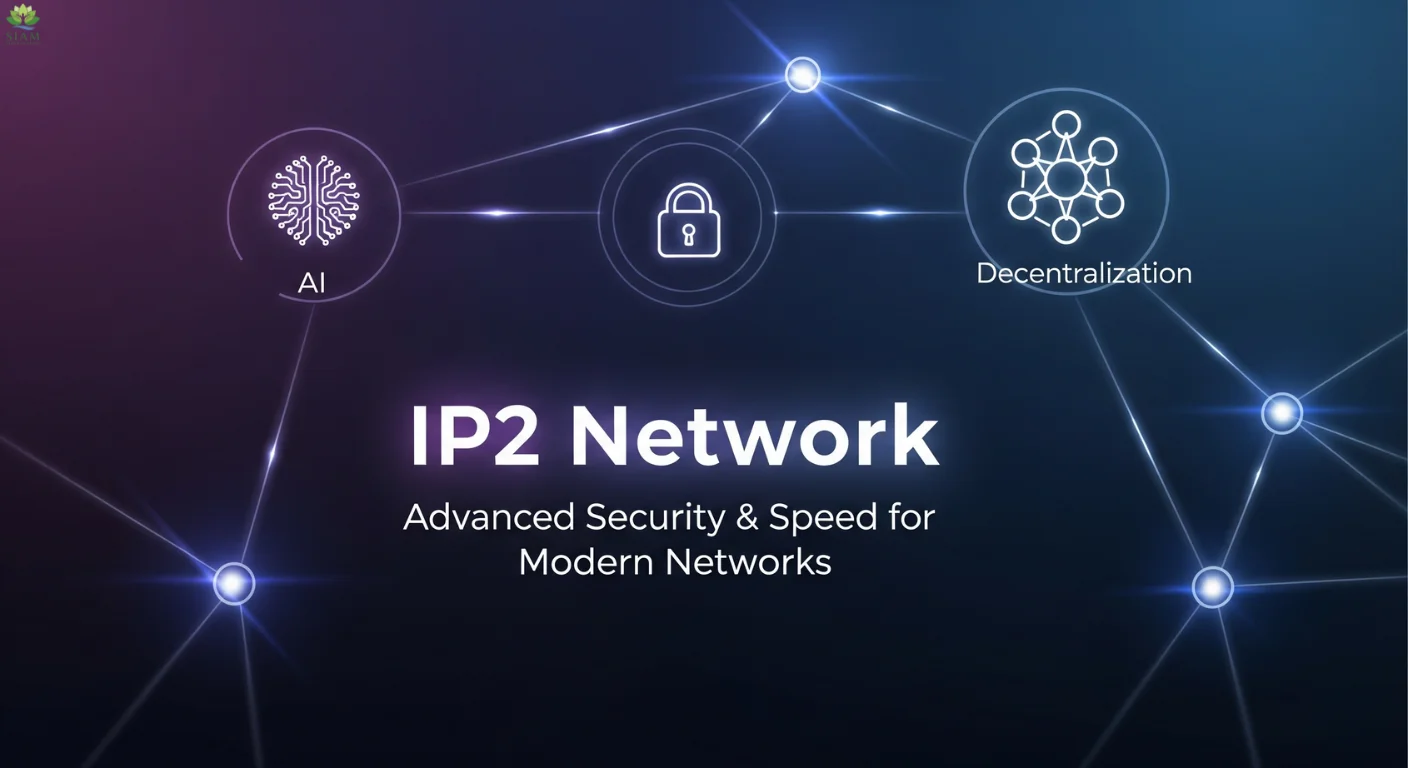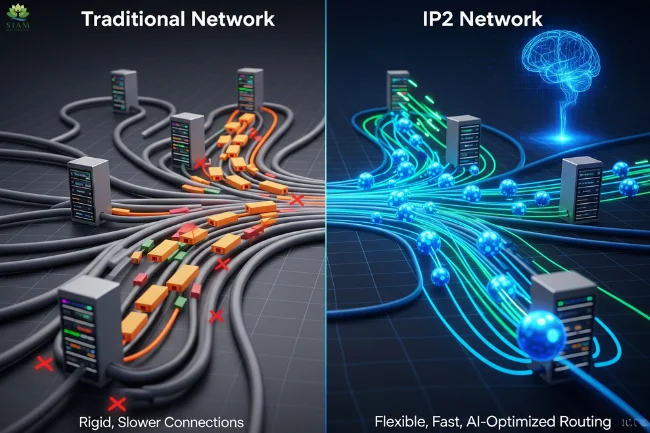In the digital age, online security and network performance have become top priorities for individuals and organizations alike. With cyber threats and data breaches on the rise, traditional networking systems like IPv4 and IPv6 often fall short of addressing the ever-growing demands for speed, scalability, and security. Enter the IP2 Network, an advanced networking platform designed to meet these challenges head-on. This article will explore the key features of this network, how it compares to traditional protocols, and its applications across various industries, while also discussing its future potential.
What is the IP2 Network?
The IP2 Network is an advanced networking solution that is revolutionizing the way data is routed and secured across the internet. Unlike traditional IPv4 and IPv6 systems, this network leverages technologies like AI-driven routing, decentralized architecture, and enhanced encryption to offer a faster, more secure internet experience. Designed with the needs of modern digital infrastructures in mind, it addresses the limitations of older systems, providing better scalability, enhanced security, and a more seamless user experience.
Key Features of the IP2 Network
This innovative network stands out for its numerous features that set it apart from traditional networking systems.
AI-Driven Routing for Faster Speeds
One of the primary benefits of the IP2 Network is its use of artificial intelligence (AI) to optimize data routing. AI-driven routing intelligently determines the best path for data to travel, minimizing latency and congestion. This leads to faster connection speeds and more efficient data transmission, ensuring users experience minimal delays and smoother communication.
Decentralized Architecture
Traditional networks rely on centralized servers, which can be vulnerable to attacks, outages, and congestion. The IP2 Network, on the other hand, uses a decentralized architecture. This means data is distributed across a network of connected nodes, reducing the risk of a single point of failure. As a result, this system is more resilient to cyberattacks and service disruptions, providing greater reliability for users.
Enhanced Encryption and Proactive Threat Detection
Security is a top concern in today’s digital landscape, and the IP2 Network is equipped with advanced encryption techniques to protect user data. With end-to-end encryption, all data transferred across the network is securely protected, ensuring that sensitive information remains private. In addition, the network incorporates AI-driven threat detection to proactively identify and mitigate potential security threats before they can cause harm. This makes the system ideal for users seeking robust protection against cyberattacks.
Scalability and Sustainability
The IP2 Network is built to scale, making it a future-proof solution for the growing demands of the internet. It is designed to support the Internet of Things (IoT), real-time applications, and other emerging technologies that require high bandwidth and low latency. Additionally, the network’s power-saving protocols contribute to green networking, making it more sustainable than traditional systems.
How It Compares to Traditional Networks
To understand the true value of this platform, it’s important to compare it with traditional networking systems like IPv4 and IPv6. Let’s take a look at the key differences:
Enhanced Performance with Low Latency
Traditional networks suffer from higher latency due to rigid routing paths. The IP2 Network addresses this by using AI to dynamically adjust the routing based on real-time conditions. This results in ultra-low latency and faster data transfer, making the network ideal for applications that require high-speed connections, such as gaming, video streaming, and cloud computing.
Built-in Security
While traditional networks rely on third-party security mechanisms like firewalls or VPNs, the IP2 Network has security features integrated directly into the protocol. This includes end-to-end encryption, AI-driven threat detection, and a zero-trust security framework, making it more secure than conventional networking systems.
Scalability and Future-Proofing
As the world increasingly relies on connected devices, traditional networks like IPv4 are struggling to keep up with the demand. The IP2 Network solves this problem with a design that can seamlessly scale to accommodate millions of devices. Whether it’s supporting the expansion of IoT networks or ensuring the smooth operation of 5G networks, this system is built for the future.
In Comparison with Other Security Solutions
In addition to traditional networks, this platform can be compared to other popular security solutions like VPNs and Tor. Each of these offers unique advantages, but the IP2 Network provides several benefits that set it apart.
| Feature | Traditional Networks (IPv4/IPv6) | IP2 Network |
|---|---|---|
| Routing | Static, manual configurations | AI-driven, dynamic routing |
| Security | Add-on solutions (e.g., VPNs) | Built-in encryption and threat detection |
| Scalability | Limited by address exhaustion | Easily scalable for IoT and real-time applications |
| Performance | Higher latency, rigid paths | Ultra-low latency, optimized paths |
| Decentralization | Centralized servers | Fully decentralized architecture |
Privacy and Security
The IP2 Network offers high privacy and strong encryption, making it a top choice for users who require anonymity and data protection. While VPNs also provide strong encryption, they rely on centralized servers, which can be vulnerable to attacks. Tor, on the other hand, offers strong anonymity but sacrifices performance speed, making it less ideal for high-bandwidth applications.
Performance and Speed
When it comes to speed, VPNs typically offer excellent performance, as they are optimized for speed. However, the IP2 Network outperforms both VPNs and Tor in terms of low latency and optimized routing, making it ideal for real-time applications and high-performance needs.
Applications of the IP2 Network
This innovative platform offers numerous applications that can benefit both businesses and individuals. Some of the most notable applications include:
Internet of Things (IoT) and Smart Cities
The IP2 Network can support the development of IoT networks, enabling devices to communicate seamlessly in smart cities. This can improve everything from traffic management to energy efficiency, making urban environments more connected and efficient.
Healthcare and Telemedicine
In the healthcare industry, the IP2 Network can support AI diagnostics, patient monitoring, and remote procedures. Its low latency and high bandwidth make it ideal for real-time applications that require instant data transmission, such as telemedicine and robotic surgery.
Cybersecurity and Threat Prevention
With its built-in encryption and AI-driven threat detection, the IP2 Network is an effective solution for preventing cyberattacks. It can secure sensitive data transmissions in industries like finance, healthcare, and government, where data breaches can have devastating consequences.
Challenges of Implementing the IP2 Network
While the IP2 Network offers numerous advantages, there are some challenges associated with its implementation. These include:
-
Migration Strategies: Moving from traditional networks to the IP2 Network requires a well-thought-out plan to ensure compatibility and minimize downtime.
-
Integration with Existing Technologies: IP2 must integrate with existing hardware and software systems, which can sometimes be challenging.
-
Training and Education: IT professionals and users may need training to fully understand and utilize the advanced features of the IP2 Network.
The Future of the IP2 Network
The IP2 Network is poised for continued growth and development. Future trends include:
-
Quantum Computing Integration: The integration of quantum computing will allow for unbreakable encryption and faster data routing.
-
5G and Beyond: As wireless technology evolves, the IP2 Network will support emerging technologies like 5G and beyond.
-
Edge Computing: Incorporating edge computing will reduce latency and improve the effectiveness of real-time applications.
Conclusion: Is the IP2 Network Right for You?
The IP2 Network represents a revolutionary advancement in networking technology. With its AI-driven routing, decentralized architecture, and built-in security features, it offers a faster, more secure alternative to traditional networks like IPv4 and IPv6. Whether you’re a business looking to scale or an individual seeking better online protection, this network provides a promising solution.
As the world becomes more connected, investing in future-proof networking solutions like the IP2 Network is essential for staying ahead of cyber threats and performance demands. If you’re ready to take your online security and performance to the next level, the IP2 Network is definitely worth considering.
FAQs
1. What is the IP2 Network?
The IP2 Network is an advanced networking platform that uses AI-driven routing, decentralized architecture, and enhanced encryption to improve online security and performance.
2. How does the IP2 Network improve online security?
The network offers built-in encryption, AI-driven threat detection, and a zero-trust framework to protect user data from cyber threats.
3. How does the IP2 Network compare to traditional IPv4/IPv6?
The network offers better scalability, lower latency, enhanced security, and decentralized architecture compared to traditional IPv4/IPv6 networks.
4. Can the IP2 Network support IoT applications?
Yes, the IP2 Network is designed to scale seamlessly, making it ideal for IoT applications and smart city infrastructures.
5. What challenges are associated with implementing the IP2 Network?
Challenges include migration strategies, integration with existing technologies, and the need for training IT professionals and end users.
6. How does the network handle data traffic during peak usage times?
The system uses advanced AI algorithms to prioritize high-demand traffic and dynamically adjust bandwidth allocation, ensuring minimal disruption during peak usage times. This intelligent management helps maintain consistent performance even during network overloads.
7. What makes the architecture of this network more reliable than traditional systems?
The decentralized structure ensures that no single server or node is responsible for the entire system’s operation. This reduces the risk of outages and improves reliability, as data is distributed across multiple points, allowing for automatic rerouting in case of a failure.
8. Can this system support real-time communication applications like video conferencing?
Yes, the network is designed to handle high-bandwidth, low-latency applications such as video conferencing and online gaming. Its advanced routing and traffic prioritization ensure that these time-sensitive applications function smoothly without significant delays.
9. What role does AI play in enhancing user experience?
AI plays a key role by optimizing data routes and predicting network congestion before it happens. This helps reduce latency, improve overall speed, and ensure users experience a seamless and responsive connection for various applications.
10. How does this system compare to traditional VPNs in terms of security and ease of use?
Unlike traditional VPNs that rely on centralized servers and often require manual configuration, this system offers built-in security features such as encryption and threat detection. It is also designed to be more user-friendly, requiring less technical setup and maintenance.
Learn About TV Model Number GUXIF304

Salman Khayam is a business consultant at Siam IT Solutions, specializing in digital marketing, PPC, SEO, web development, e-commerce, and email marketing. He designs custom strategies that deliver measurable success.


